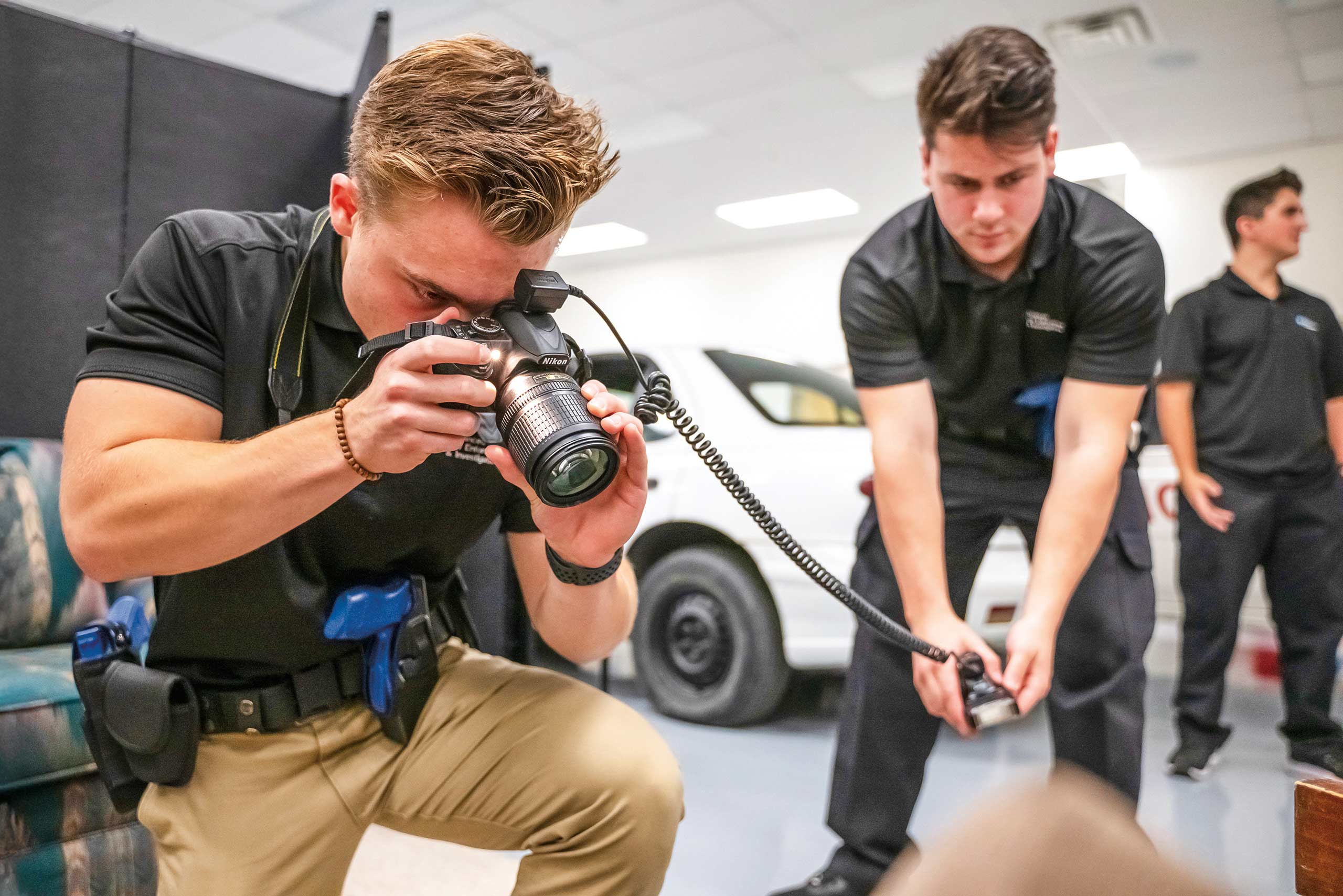- Applicants must possess a level of physical fitness that allows them to successfully complete the Pursuit and Restraint Circuit within 2 minutes and 37 seconds or less, as well as achieve a stage 7 on the 20m Leger Shuttle Run.
- Information regarding the Physical Readiness Evaluation for Police (PREP) is available at here.
- Medical requirements for candidates of the Constable Selection System are available here.
About this program
-
Credential Awarded: 1 Year Graduate Certificate
-
Campus: Welland
-
Code: 0250 P0250
-
Delivery Length: 1 Year
Who are you?
- I am a domestic applicant. *
- I am an international applicant.
Your education at Niagara College begins with your application. We're here to help make the process easy!
- Carefully read the Admission Requirements tab to make sure you meet the program requirements.
- Check the Availability tab to see whether or not the program is accepting applications, and what start dates are available.
- Complete an application online through ontariocolleges.ca.
- Our Admissions Office will acknowledge your application has been received and will provide you with your NC Student ID number and details on your next steps.
Sorry, international applications are not accepted for this program.
By Email
Reach out to us using our contact form and we'll respond within regular business hours.
Contact UsOne-on-One Session
Have questions about this program or NC? Speak with a friendly Student Recruiter!
Book a One-on-One SessionRequest Program Information
Want to receive more information about this program? Join our email list to receive program and event updates!
On-Campus Tours
Book a tour at one of our campuses and explore our incredible learning and service spaces in-person!
Book an On-Campus TourVirtual Tours
Take a self-guided, virtual walking tour of our campuses and explore our labs and common spaces.
Take a Virtual TourInformation Sessions
Join us for an information session and explore the pathways and programs offered at NC!
Register for an Info SessionOverview
Do you have a college diploma or university degree in a justice-related field and want to develop advanced investigative skills in preparation for a career in law enforcement?
As a graduate of the Advanced Law Enforcement and Investigations program, you are well prepared for an exciting career in the private or public justice sector.
Courses
| Code | Course Name | Credits |
|---|---|---|
| PFPP9100 | Police Applicant Procedure and Preparation | 2 |
| PFPP9102 | Applied Community Policing | 3 |
| PFPP9103 | Document Analysis | 1 |
| PFPP9115 | Advanced Crime Scene Analysis | 3 |
| PFPP9126 | Case Preparation and Documentation | 3 |
| PHED9101 | Physical Fitness for Policing | 2 |
| PHIL9122 | Ethics and Leadership | 3 |
| PRAC9105 | Field Placement I - Advanced Law Enforcement | 1 |
| Code | Course Name | Credits |
|---|---|---|
| PFPP9113 | Advanced Document Analysis | 1 |
| PFPP9120 | Advanced Police Studies | 3 |
| PFPP9130 | Evidence and Court Procedure | 3 |
| PFPP9132 | Professionalism in Policing | 2 |
| PHED9121 | Advanced Physical Fitness for Policing | 2 |
| PSYC9117 | Psychological Emergencies and Intervention Strategies | 3 |
| PSYC9125 | Conflict Resolution | 3 |
| PRAC9205 | Field Placement II - Advanced Law Enforcement | 1 |
Learning Outcomes Term: 1264
Work in compliance with all legal and legislative requirements, and professional, organizational and ethical standards in the conduct of advanced investigations and law enforcement.
Collect, preserve and record evidence utilizing specialized crime scene procedures.
Articulate accurately, persuasively and credibly the legal authority and justification for their conduct in carrying out advanced investigations.
Assess the use and application of specialized investigative techniques in carrying out investigations.
Collect, preserve and record evidence utilizing specialized crime scene procedures.
Apply specialized knowledge and investigative techniques related to the use, detection and distribution networks of counterfeit documents and goods.
Evaluate and utilize advanced leadership and communication skills to effectively manage individuals, groups and multidisciplinary teams.
Assess and evaluate the various psychological emergencies that affect individuals suffering from panic, anxiety, depressive, bipolar and schizophrenic disorders and utilize the appropriate intervention strategies to manage emergency situations.
Articulate accurately, persuasively and credibly the legal authority and justification for their conduct in carrying out advanced investigations.
Utilize appropriate problem solving skills, non violent intervention techniques and other intervention strategies to effectively manage conflict and crisis situations.
Compose crown briefs, testify and present physical evidence in court professionally, effectively and in compliance with federal and provincial law, rules of evidence and the Charter of Rights and Freedoms.
Evaluate and utilize advanced leadership and communication skills to effectively manage individuals, groups and multidisciplinary teams.
Develop, evaluate and implement a personal fitness plan to meet or exceed the occupational fitness standards related to the law enforcement profession.
Admission Requirements
- Ontario College Diploma (or equivalent) in Police Foundations or Protection, Security and Investigation (Law and Security Administration) or
- Bachelor’s Degree in Criminology, Law and Justice, Criminal Justice, Criminal Justice and Public Policy, Criminology and Justice, Sociology, Legal Studies and Political Science or
- an acceptable combination of related work experience and postsecondary education (as determined by the College)
- Proof of English proficiency
- Completion of the Physical Readiness Evaluation for Police (PREP) test
Selection and Ranking
Testing or other supplemental evaluation may be required.
Learn more about admission decisions.
Note
Most private college courses and/or credentials are not acceptable as admission requirements for Niagara College programs.
Please contact the Admissions office at [email protected] for assistance.
Pre-Admission Requirements
As part of the admissions process some programs have pre-admission requirements.
Domestic Applicants:
Detailed pre-admission requirements for domestic applicants can be found at niagaracollege.ca/par.
Domestic applicants include Canadian citizens, permanent residents and Convention refugees.
Program Requirements
Criminal Record Check
- A Criminal Record Check which is less than 6 months old is required at the beginning of the program.
-
The purpose of this program at Niagara College is to prepare students for a career in law enforcement. All in-class, simulated and field practicum learning environments including Ride-Along and other field placement opportunities within the program, reflect the standards of the participating police services (field placement agencies) and require that applicants to the ALEI program undergo a screening process similar to that utilized by the law enforcement community.
Many employers including police agencies have instituted a CRC with vulnerable sector screening as a requirement for appropriate field placements. The CRC will be required at the beginning of the program or prior to the term in which placement opportunities are available. All costs associated with the CRC are the responsibility of the student.
Field placement agencies will also conduct criminal record and background checks on participants intending to participate in Ride-Along or Volunteer field placement positions. Students who have engaged in any unlawful conduct, whether they have been convicted or not, or who have had any contact with a law enforcement agency including but not limited to; contact related to driving history, illicit drug use, criminal convictions, criminal associations or other personal behaviours deemed by the law enforcement agency to be inappropriate, may be prevented from participating in Ride-Along and other field placement opportunities. A field placement agency reserves the right to deny an applicant access to field placement and also reserves the right to not disclose the reason(s) for such a denial. Ride-Along field placements and other field placements are mandatory for the completion of the program. The inability to qualify for Ride-Along or other field placements will prevent graduation from the program.
Applicants with questions about the impact that their past driving history, illicit drug use, criminal convictions, criminal associations and or other personal behaviours may have on their ability to be considered for this program, are strongly encouraged to contact the Advanced Law Enforcement and Investigations Program Coordinator prior to application.
Computer Requirements
Students are responsible for ensuring that they have a Microsoft Windows-based desktop or laptop that meets or exceeds the following general requirements:
- A desktop or laptop running on an updated Microsoft Windows operating system (Windows 11 recommended).
- Minimum 256GB SSD storage and 8 GB memory (note that 16 GB memory is strongly recommended).
- An integrated or peripheral video camera, microphone, and speaker system.
- Reliable internet connectivity with Broadband capabilities. A minimum download speed of 10 – 50 Mbps is recommended.
Niagara College may not be able to provide support for systems different than the above specifications as provided software may not operate properly. Academic software for your courses will be made available for download and remote use. Access will also be provided to remote high performance computer labs if software downloads are not feasible.
Note: We do not provide support for Chromebooks or Apple products. (learn more)
The technology requirements indicate there is no support for Chromebooks or Apple products. Can I still take my program if I have a Macbook or Chromebook?
For most programs, the recommendation is to have a MS Windows 11 computer for an optimal experience and for ease of downloading academic software. The reliability of remote connections to college computers and software cannot be guaranteed for Macbook and Chromebook users.
The Microsoft Office suite products that are available free to Niagara College students though Office 365 do have versions that work with Macbooks and Chromebooks, and most internet-based applications will work as well. However, some program-specific software is designed to run on Windows 10/11, and the successful download of these applications cannot be guaranteed.
Our Learning Management System (LMS) at Niagara College is Brightspace, and while students can access Brightspace through an internet browser, for some assignments and tests there is a layer of security that uses a proctored browser. The proctored browser will not function on Macbooks or Chromebooks.
Students assume the risk of a compromised virtual experience if they choose to participate without the recommended technology.
Computer/technology requirements may be subject to change without notice.
All costs associated with program requirements are the responsibility of the student.
Back to TopAvailability
Domestic Applicants Apply
Legendfor intake status table
Open
Accepting applications
Waitlisted
Eligible applications will be placed on a waiting list
Closed
Not accepting applications
Suspended
No longer offered this term
International Applicants
Sorry, international applications are not accepted for this program.
The College reserves the right to cancel or make changes to any course or program, fee, procedure, or campus location at any time.
Back to TopTuition
The below is a tuition fees estimate ( what's this?) for the indicated start term. Tuition fees are set in accordance with the Ontario Ministry of Training, Colleges and Universities fee guidelines.
Year 1
Level one $3,955.30
| Fee Type | Fee Cost |
|
Tuition
|
$2,049.10
|
|
Ancillary Fees
|
$1,269.20
|
|
Material Fees
|
$637.00
|
|
Level one Total
|
$3,955.30
|
Level two $3,173.30
| Fee Type | Fee Cost |
|
Tuition
|
$2,049.10
|
|
Ancillary Fees
|
$939.20
|
|
Material Fees
|
$185.00
|
|
Level two Total
|
$3,173.30
|
We're helping make your NC dreams a reality.
To help fund your education access $1.5 million in scholarships and awards made available by our generous donors. You will be automatically considered for some awards, however other awards will require an application.
Explore Scholarships & BursariesAdvanced Tuition Tool
The tuition amounts provided are an estimate only ( what's this? ).
To generate a detailed fees calculation, which includes tuition, ancillary, and material fees for this or a different start term, please access the Advanced Tuition Tool.
Generate My FeesSorry, international applications are not accepted for this program.
What is your tuition estimate?
Your tuition estimation includes tuition, ancillary, and material fees based on a program and term. Fees may vary upon enrolment into specific courses that are outside of the core curriculum or elective courses. Fees for future terms (where fees have yet to be published) are estimates based on the current academic year fee structure.
Additional fees include textbooks and a parking pass (if parking on campus). Additional costs may be incurred for optional field trips, learning materials, equipment or clothing. All costs associated with program requirements are the responsibility of the student.
Note: For new programs tuition and fees may not yet be available. Typically tuition amounts are available in May for the next academic year. Please check back.



